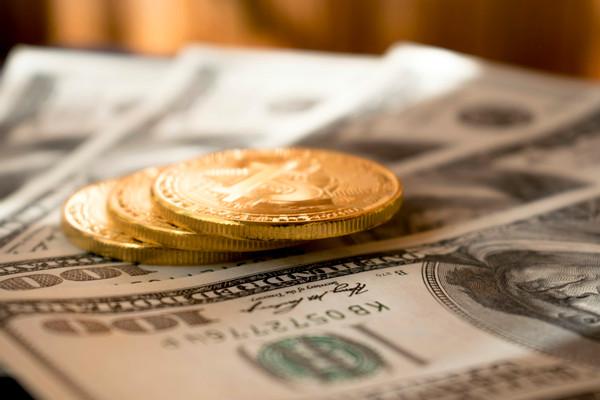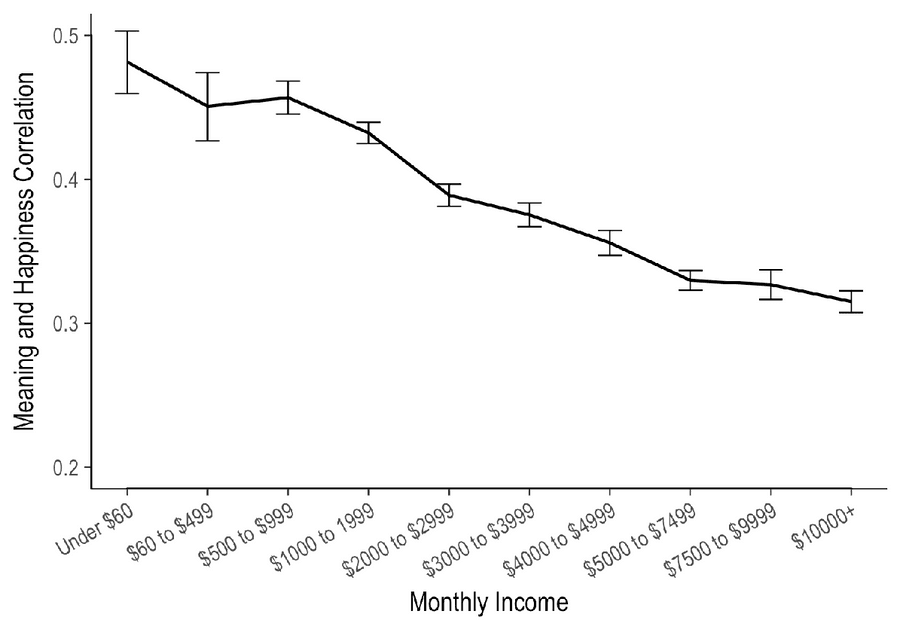Can't buy me meaning? Money cuts a quicker path to happiness
Curated from: bigthink.com
Ideas, facts & insights covering these topics:
11 ideas
·1.13K reads
7
1
Explore the World's Best Ideas
Join today and uncover 100+ curated journeys from 50+ topics. Unlock access to our mobile app with extensive features.
Key Takeaways
- Researchers and philosophers identify two types of psychological well-being, which can be summarized as the purposeful and the pleasurable.
- Previous research has already established that, on average, wealthy people experience happier, more meaningful lives.
- A new study asks a more nuanced question: Does meaning predict happiness, regardless of wealth? The results suggest that meaning is less important to happiness for wealthy people.
- More importantly, meaning may be extra important for people without much money.
12
153 reads
Defining Meaning and Happiness
Researchers and philosophers differentiate between two types of psychological wellbeing: eudaimonic (the meaningful, purposeful, or significant) and hedonic (the pleasurable or enjoyable). The latter aligns with what most people term “happiness.”
To understand the distinction, imagine working hard on an important life goal. This might feel meaningful, but unpleasant. On the other hand, taking heroin might feel meaningless, but enjoyable.
14
149 reads
Finding Meaning Boosts Happiness
Meaning and happiness are rarely totally separate. In general, meaningful experiences make people feel happy, and vice versa. For example, spending time with friends, buying gifts for others, and celebrating life milestones can be both meaningful and enjoyable.
Finding meaning in life is therefore usually a good way to boost happiness.
13
118 reads
Money Does Buy Happiness
To the possible disappointment of anyone hoping to indulge in some schadenfreude, prior research establishes that, on average, wealthy people experience happier and more meaningful lives than their lower-income counterparts. This is probably because money can buy both meaning and happiness, so long as you spend it in the right way — for instance, by purchasing experiences, time with loved ones, or gifts for others.
15
125 reads
The Paradox Of Wealth
On one hand, meaning might be especially important for wealthy people’s happiness, since all of their basic needs are met and they have the resources to pursue grand, meaningful experiences.
On the other hand, meaning may be less important, because it is easier for the wealthy to pursue happiness in other ways, like fancy trips, fun cars, and big parties.
12
117 reads
Study 1: The Americans
The wealthier someone is, the less meaning affects their happiness levels. Importantly, this does not mean that high-income people reported less overall meaning or happiness — their levels were about as high, or even higher, than those of lower-income participants.
But the study found that meaning was less important to their happiness.
12
90 reads
Study 2: The World
Once again, the correlation between meaning and happiness became smaller as wealth increased.
This pattern held in 10 out of 11 world regions, including Latin America, Sub-Saharan Africa, the Middle East, and Europe.
12
85 reads
Study 3: Different Questions
For wealth status, participants rated their socioeconomic status using the MacArthur social ladder, which asks participants where they believe they stand compared to others considering their money, education, and jobs.
Once again, the higher someone reported being on the socio-economic ladder, the less meaning predicted their happiness.
13
72 reads
Confounding Factors
One of the downsides of large survey studies, of course, is that the researchers cannot control every relevant factor that could affect the results. In particular, age and religiosity are correlated with meaning and income, making them potential confounding factors. Additionally, income might affect how much meaning and happiness vary — in other words, how much their scores can be expected to spread out. This can affect statistical analyses.
12
70 reads
The Findings: The Rich Are Busy Being Rich
In short, data from more than 500,000 people suggest that meaning is less important to happiness for wealthy people. This does not mean that wealthy people are struggling to find meaning: Both their meaning and happiness levels are on par with, or even higher than, their lower-income counterparts.
Perhaps wealthy people simply do not need meaning to be happy. Their resources minimize the stress of meeting daily needs like paying bills or affording food. They can also afford the kinds of purchases that boost happiness, like fun experiences and enjoyable hobbies.
13
80 reads
Meaning Is A Currency Of The Poor
The more important takeaway is that meaning may be extra important for people without much money. Compared to their wealthier counterparts, poor people suffer high rates of depression and other mental health problems. Incorporating meaning-making into one’s life may be a free way to improve happiness.
15
78 reads
IDEAS CURATED BY
CURATOR'S NOTE
Money brings in freedom and happiness.
“
Reese R.'s ideas are part of this journey:
Learn more about moneyandinvestments with this collection
How to develop a healthy relationship with money
How to create a budget
The impact of emotions on financial decisions
Related collections
Similar ideas
6 ideas
Money or Wealth
nateliason.com
2 ideas
A Key Factor in Well-Being: Others’ Apparent Wealth
insights.som.yale.edu
Read & Learn
20x Faster
without
deepstash
with
deepstash
with
deepstash
Personalized microlearning
—
100+ Learning Journeys
—
Access to 200,000+ ideas
—
Access to the mobile app
—
Unlimited idea saving
—
—
Unlimited history
—
—
Unlimited listening to ideas
—
—
Downloading & offline access
—
—
Supercharge your mind with one idea per day
Enter your email and spend 1 minute every day to learn something new.
I agree to receive email updates











